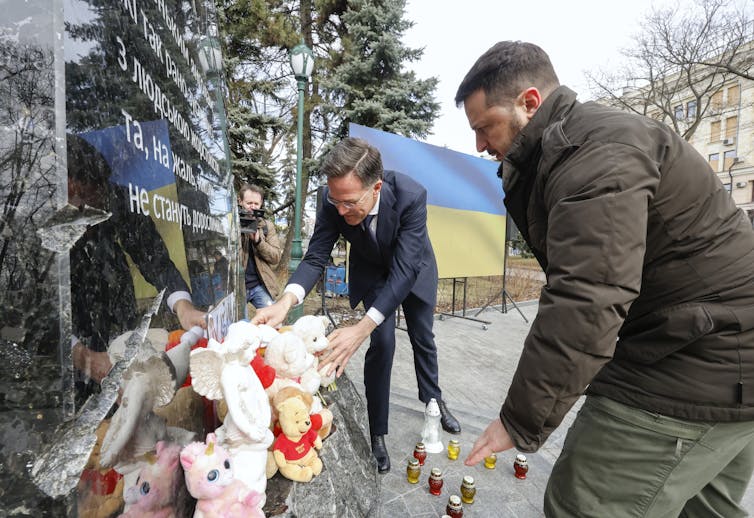Mark Rutte, the outgoing prime minister of the Netherlands, will become Nato’s next secretary general when Jens Stoltenberg steps down in the autumn. Rutte’s candidacy has been endorsed by all 32 member states, most recently by Hungary and Slovakia, which confirmed their backing on June 18. The Romanian president Klaus Iohannis – Rutte’s last rival for the post – withdrew his candidacy on June 20. Stoltenberg’s tenure is due to end on October 2.
Rutte is the longest-serving prime minister in the history of the Netherlands, having served in the role since 2010. He will take up his new post with Nato facing a range of challenges. The war in Ukraine and China’s increasing ambitions in international politics will be the two most immediate issues in his in-tray.
But he will also be aware of the need to address the rise of nationalist and populist movements in Nato member states that challenge his organisation’s internal unity. Another major challenge could well confront him just a month into his tenure, with the possible election of Donald Trump for a second term as US president.
So what can we expect from Rutte as Nato chief in turbulent times, based on his 14 years steering Dutch politics through a variety of crises? A closer look at his experience shows he is well placed to deal with both external and internal threats to Nato’s cohesion.
On the potential challenge to Nato posed by the US election, Rutte has been portrayed as a “Trump whisperer” – he is widely seen as one of the few political leaders that is capable to deal with the former (and possible future) US president. For example, at the 2018 Nato summit, Rutte successfully engaged with Trump to ease tensions over defence spending, demonstrating his ability to manage the former president’s unpredictable style.
In direct contrast to Trump, Rutte has been an outspoken supporter of Ukraine since the Russian invasion in 2022. The Ukrainian president Volodymyr Zelensky often refers to him as “my friend Mark”.
But Ukraine aside, in 14 years at the helm of Dutch politics have given Rutte a solid grounding in crisis management, particularly within the EU in which he presented a strong voice. During the Eurozone crisis in the 2010s, he strongly advocated for austerity measures and economic reforms in hard hit southern Europe, which gained him a reputation as a a tough and sometimes hardline negotiator.
Recently, he gained status as a “dealmaker” during several crises in the EU. For example, Rutte played a significant role in shaping EU migration policies, most notably with the EU-Turkey deal in 2016 aimed at curbing migration through Turkey to Europe. In 2023, he co-initiated a similar agreement between the EU and Tunisia alongside EU commissioner, Ursula von der Leyen, and Italy’s Giorgia Meloni.
Consensual politics
Rutte’s leadership style has often been described by journalists and his peers as “pragmatic”. Rutte himself contributed to this image during a famous speech in 2013, in which he purposefully presented himself as a politician without vision, saying that “vision is like an elephant that obstructs the view”. According to Rutte, grand visions hinder practical and actionable governance.

Instead Dutch politics has become known as the “politics of accommodation”. The political system is characterised by multiparty politics and coalition governments – Rutte’s People’s Party for Freedom and Democracy (VVD) has been part of various coalition governments over his prime ministership, with partners as diverse as the right-wing populist Freedom Party of Geert Wilders, the Labour Party and, since 2017, with the Christian democratic CDA, the progressive Democrats 66 and the conservative Christian Union.
But in Dutch politics forming a multi-party coalition is only a beginning. Although Rutte’s governments was supported by a majority in the House of Representatives (Tweede Kamer), Rutte could not always count on majority support in the Senate (Eerste Kamer). So in order to get legislation through, he has had to reach agreements on important policy proposals with opposition parties as diverse as the left-wing Greens and the small, conservative Reformed Political Party (SGP).
Rutte has always also depended on the support of various social partners, including employers’ associations, labour unions and other interest groups. His governments are known for akkoordenpolitiek (“accord politics”), in which policy agreements have been reached involving broad coalitions of stakeholders, for instance, on issues as climate, energy and pensions.
His pragmatic ability to build and maintain coalitions in such a politically fragmented landscape is often considered as a hallmark of his leadership. Rutte’s pragmatism has been instrumental in facing an era of polycrisis, where his government has had to deal with one problem after another, some overlapping, including the refugee crisis in Europe, COVID and the war in Ukraine.
‘Teflon Mark’
Despite his openness to working across the political spectrum, he has on occasions faced criticism for a lack of transparency and for prioritising strategic benefits over democratic accountability.
Importantly, three out of the four Rutte governments have collapsed before reaching the end of their terms. But he has also earned a reputation as a political survivor and his nickname is “Teflon Mark”. It should be noted that his survival has at times come at the cost of some of his cabinet members, as several ministers had to resign after political crises.
With Rutte, Nato gets a secretary general with long-term experience in coalition politics, who understands the art of negotiating and compromising. This can be an important skill in a military alliance with 32 member states. He also has a proven track record in crisis management during national and EU crises.
While Nato faces some big challenges in its response to the invasion of Ukraine and the rising nationalism and global power shifts, Rutte’s crisis management experience might have provided him with important lessons on how to navigate problems and provide a workable response.

